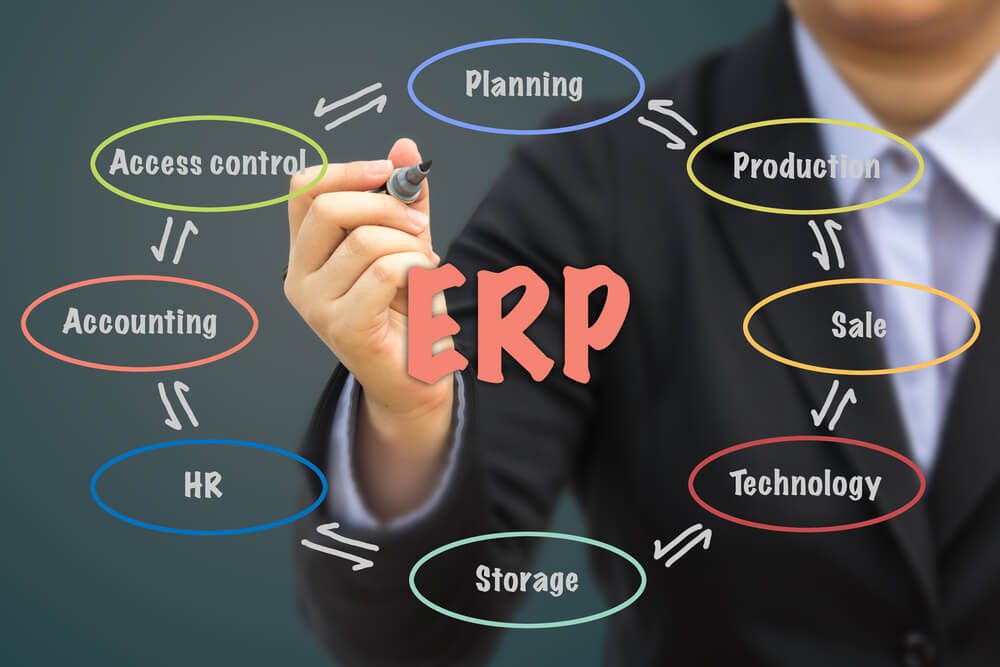Diploma in Enterprise Resource Planning (ERP)
Overview
Enterprise Resource Planning (ERP) is a kind of business management software, usually a suite of applications, which an organisation can use to store, collect, manage and interpret data from their various business activities. ERP is a big benefit to business, as it gives you an integrated and continuously updated view of core business processes, and aids you in tracking and monitoring all the processes of your business at once. This excellent ERP Diploma (USA Standards) will give you a comprehensive guide to ERP, including the advantages, disadvantages, and operations of ERP systems.
By enrolling in this course, you will get to indulge in a training program that will not just relay the theories or details, but will aim for a more hands-on approach by helping you navigate the software with ease. The course curriculum will also cover the groups involved in the ERP market, its IT architectural components, cost benefit analysis and the practical aspects of ERP to make the learning process a more meaningful one.
This course is comprised of professionally narrated e-Learning modules, interactive quizzes, tests, and exams. All delivered through a system that you will have unlimited access.
Please Note: This Course is Based on USA Standards
- What will I learn?
- Course Description:
- Course Duration:
- Method of Assessment:
- Certification:
- Requirement:
- Career Path:
- Understand ERP and IT Architectural Components
- Understand Analysis and Implementation of ERP
- Understand ERP implementation on Open Source Software
- Understand The relationship between ERP and Shared Services
This online training course is comprehensive and designed to cover the key topics listed under the curriculum.
You will have unlimited access to your online study platform from the date you purchased the course. The course is self-paced so you decide how fast or slow the training goes. You can complete the course in stages revisiting the training at any time.
At the end of the course, learners will take an online multiple choice question assessment test. The online test is marked straight away, so you will know immediately if you have passed the course.
Successful candidates will be awarded a certificate for Diploma in Enterprise Resource Planning (ERP).
Learners must be age 16 or over and should have a basic understanding of the English Language, numeracy, literacy, and ICT.
With this Diploma in Enterprise Resource Planning (ERP), you will be able to demonstrate skills which are highly desirable in the job market, particularly for ERP Systems Administrators. The average Enterprise Resource Planning (ERP) Developer in the UK earns around £45,781 a year, and this can increase with experience (payscale.com). This training course will help you fulfil a whole range of positions, including:
- ERP Systems Administrator
- Enterprise Resource Planning (ERP) Developer
- Systems Administrator
- ERP Systems Support
- ERP Project Manager
[vc_row][vc_column][vc_cta h2="Still not convinced?" add_button="left" btn_title="Download Brochure" btn_color="green" btn_i_icon_fontawesome="fa fa-file-pdf-o" btn_add_icon="true" btn_link="url:https%3A%2F%2Fwww.study365.co.uk%2Fwp-content%2Fuploads%2F2018%2F07%2F3.Diploma-in-Enterprise-Resource-Planning-ERP.pdf||target:%20_blank|" btn_custom_onclick="true" css=".vc_custom_1475836716759{background-color: #ffffff !important;}"]Download our course brochure & learn more about this course.[/vc_cta][/vc_column][/vc_row]
Course Curriculum
| Getting Started | |||
| E Certificate Download Guide | 00:00:00 | ||
| 1: Introduction to ERP | |||
| 1. Introduction to ERP | |||
| ERP and Why we learn it | |||
| Features of ERP | |||
| Uses of ERP in Organizations | |||
| 2: Advantages and Effects of ERP | |||
| 2. Advantages and Effects of ERP | |||
| Benefits expected from ERP | |||
| Effect of ERP | |||
| Risks of Implementing ERP | |||
| Additional Information | |||
| 3: Operations of ERP Systems | |||
| 3. Operations of ERP Systems | |||
| Value Chain vs Supply Chain | |||
| The Origin of ERP | |||
| The first ERP systems –Data Integration and Manufacturing | |||
| Extensions of ERP – Data Integration and other Value Chains | |||
| Extensions of ERP – Best Practises | |||
| Extensions of ERP –Data Integrations in the Supply Chain | |||
| Additional Information | |||
| 4: Groups Involved in the ERP Market | |||
| 4. Groups Involved in the ERP Market | |||
| ERP Software Providers | |||
| Implementations of ERP | |||
| Running an operational ERP | |||
| Additional Information | |||
| 5: ERP and IT Architectural Components | |||
| 5. ERP and IT Architectural Components | |||
| ERP and its Architecture | |||
| Physical IT Structure of an ERP system | |||
| Application of ERP on Mainframe Architecture | |||
| 6: ERP and IT Architectural Components - Part 2 | |||
| 6. ERP and IT Architectural Components – Part 2 | |||
| ERP on client servers and its Architecture | |||
| ERP Operations in Browser | |||
| Additional Information | |||
| 7: Analysis and Implementation of ERP | |||
| 7. Analysis and Implementation of ERP | |||
| ERP Evaluation | |||
| Factors to be considered when implementing ERP | |||
| Preplanning of the supply chain and implementing methods | |||
| 8: Strategize in ERP | |||
| 8. Strategize in ERP | |||
| Model Building Strategy | |||
| Go Live Strategy | |||
| Additional Information | |||
| 9: Looking into the Functional Fit Analysis | |||
| 9. Looking into the Functional Fit Analysis | |||
| Explanation about the Functional Fit Analysis | |||
| Methods of Functional Fit Analysis | |||
| Approach to the Functional Fit Analysis | |||
| Additional Information | |||
| 10: Analysis of Risks | |||
| 10. Analysis of Risks | |||
| Risks in ERP | |||
| The Ways of Risk Annalysis | |||
| The means of which you tackle risks | |||
| Additional Information | |||
| Relevance of Cost Beneficial Analysis | |||
| 11: Usage of the Cost Benefit Analysis | |||
| 11. Usage of the Cost Benefit Analysis | |||
| A method for cost benefit analysis | |||
| Execution of Cost Benefit Analysis | |||
| Overview Cost Benefit Analysis | |||
| 12: Practical Aspect of ERP Part 1 | |||
| 12. Practical Aspect of ERP Part 1 | |||
| Understanding the parameters of the example company | |||
| The ERP implementation on P&V | |||
| Summary of the principles of Implementation of ERP | |||
| 13: Practical aspect of ERP Part 2 | |||
| 13. Practical aspect of ERP Part 2 | |||
| Application of the Functional Fit Analysis on practical problems | |||
| Running a risk analysis for the business | |||
| Cost benefit analysis | |||
| Final Decision making through analysis | |||
| 14: Enterprise Resource Planning (ERP) | |||
| 14. Enterprise Resource Planning (ERP) | |||
| What is Open Source Software | |||
| ERP development in Open Source Software | |||
| 15: ERP implementation on Open Source Software | |||
| 15. ERP implementation on Open Source Software | |||
| Plans of Implementation | |||
| Overview of Open Source Software in Relation to ERP and it’s Implementation | |||
| 16: ERP effect on Corporate Governance | |||
| 16. ERP effect on Corporate Governance | |||
| Introduction about Corporate Governance | |||
| Corporate governance legislation | |||
| Fundamentals in Internal Control | |||
| The Impact of ERP on Internal Control | |||
| Overall understanding of the relationship between ERP and Internal Control | |||
| 17: The relationship between ERP and Shared Services | |||
| 17. The relationship between ERP and Shared Services | |||
| What are Shared Service Centres? | |||
| Interconnection between ERP and Shared Services | |||
| Recommended Plans for Implementation | |||
| Summary about Shared Services and it’s connection to ERP | |||
| 18: Critique of ERP | |||
| 18. Critique of ERP | |||
| Sections of ERP Systems with critical evaluations | |||
| Conundrums in ERP best practice processes and competitive | |||
| Overall view of the difficulties of ERP | |||
| 19: References in ERP Guide | |||
| 19. References in ERP Guide | |||
| References | |||
| Endnotes | |||
| Mock Exam | |||
| Mock Exam: Diploma in Enterprise Resource Planning (ERP) | 00:50:00 | ||
| Exam | |||
| Exam: Diploma in Enterprise Resource Planning (ERP) | 00:50:00 | ||






Cole Bockman
Loved the diploma, gives you great insight and over view to ERP systems, which are valuable and will supplement my career pursuits
Francis Andrew
Great guidance provided by the panel of tutors. I now have a good grip on ERP to manage various business data and information within an organisation. I am sure this certificate will help me in winning various opportunities in the corporate world.